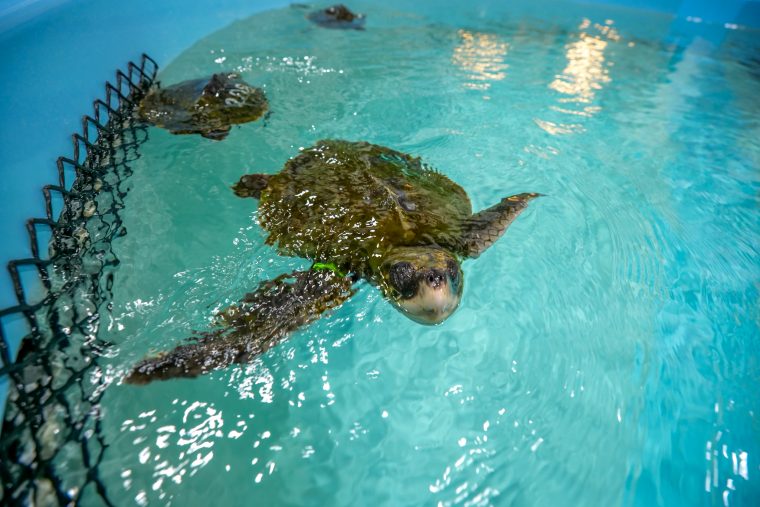119 turtles rescued from Cape Cod beaches & treated by Aquarium; transport flights to partner organizations begin

BOSTON, MASS. (Nov. 29, 2021) – After a slow start to the annual sea turtle stranding season, the New England Aquarium is treating an increasing number of hypothermic turtles rescued from Cape Cod beaches, with partner organizations stepping in to help transport and rehabilitate the animals.
**PHOTOS AND VIDEO AVAILABLE HERE, WITH CREDIT TO NEW ENGLAND AQUARIUM**
Rescue and Animal Health staff at the Aquarium’s Sea Turtle Hospital in Quincy, MA, have so far cared for 119 sea turtles: 109 critically endangered Kemp’s ridley turtles, eight green turtles, and two loggerheads. The turtles are receiving treatment for life-threatening medical conditions including pneumonia and dehydration, a result of days or weeks of hypothermia and the inability to feed.
“After months of planning and preparation, our team has mobilized quickly to triage these animals as temperatures dip in Cape Cod Bay and lead to more and more strandings,” said Adam Kennedy, Manager of Rescue and Rehabilitation.
Each year, hundreds of cold-stunned sea turtles wash up on the beaches of Cape Cod. Because of the rapidly changing water temperature and wind pattern, many turtles cannot escape the hook-like area of Cape Cod Bay before becoming hypothermic. Starting in October, staff and volunteers with Massachusetts Audubon Wellfleet Bay Wildlife Sanctuary begin to comb the beaches looking for stranded, hypothermic turtles that are then transported to the Aquarium’s Sea Turtle Hospital. This year, the season got off to a late start due to temperature fluctuations that kept Cape Cod Bay warm, with the first few turtles admitted to the Sea Turtle Hospital on November 17. This past Saturday alone, 41 turtles were taken to the Aquarium’s facility for care. Two of the more unusual cases include a loggerhead as well as a 20-pound green turtle.
“Early in the season, we typically see the smaller Kemp’s ridley and green turtles. The larger loggerhead turtles will start to wash ashore in December, though we saw our first loggerhead of the season on Thanksgiving Day. Every case is unique, and each turtle receives specific care based on its condition,” said Dr. Charles Innis, Director of Animal Health at the Aquarium.
Hospitalized turtles are managed similarly to hospitalized humans. They are assigned an identification number, a medical record is created, and they are evaluated to determine the nature of their illness. The turtles are assessed through physical examination, bloodwork, X-rays, and measurement of heart rate and respiratory rate. Due to the severity of their illness, many turtles require weeks or months of treatment, including fluid therapy and antibiotics.
Once turtles are stabilized, the Aquarium’s veterinarians will clear them for travel to a secondary rehabilitation facility. The Aquarium works closely with colleagues at the National Oceanic and Atmospheric Administration’s (NOAA) Fisheries Service to identify rehabilitation centers across the country that can accept the stabilized turtles, making room for new arrivals in Massachusetts. The non-profit organization Turtles Fly Too plays a key role in transporting the turtles to these facilities. On Monday, volunteer pilots with Turtles Fly Too flew more than 40 turtles from the New England Aquarium and National Marine Life Center south where they will continue rehabilitation before being released back into the ocean. The partner organizations providing care include the South Carolina Aquarium, the Georgia Sea Turtle Center, North Carolina Aquariums, and the Karen Beasley Sea Turtle Rescue and Rehabilitation Center. Another transport flight is scheduled for later this week to Florida.
Donations are crucial to continuing this work. The Aquarium is launching a Giving Tuesday campaign to help support sea turtle rescue and rehabilitation. On Nov. 30, each donation will be matched dollar-for-dollar up to $200,000, thanks to an anonymous donor. Supporters can visit this website to contribute.
